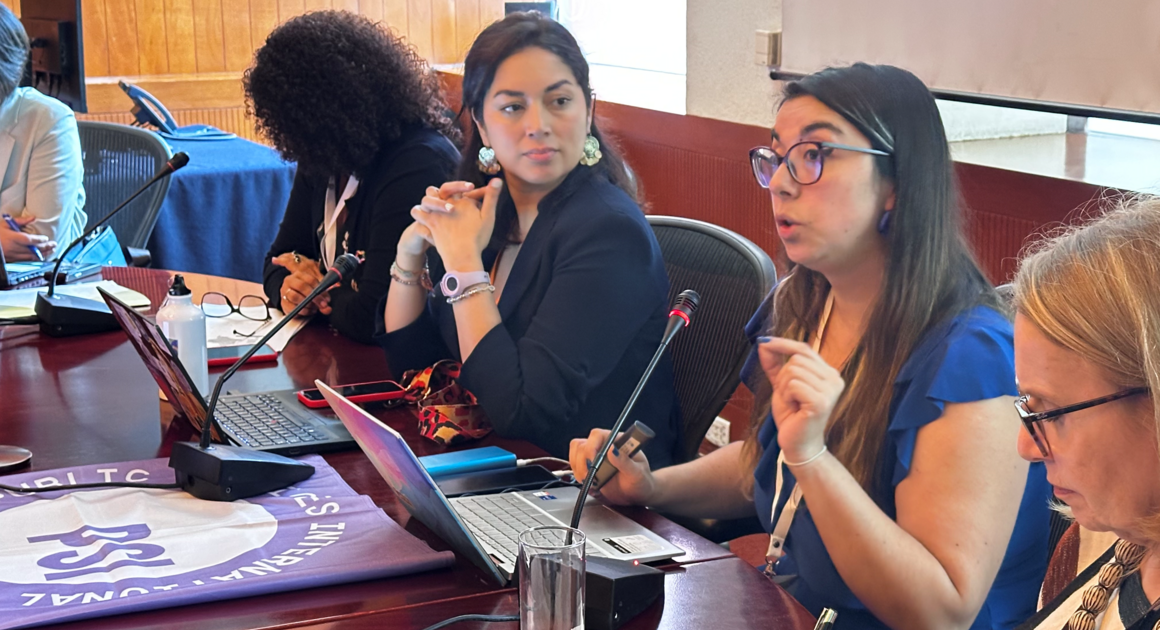during Women Regional Conference in Mexico PSI demands public and feminist care pact with the State as the main guarantor

PSI's proposal suggests breaking with the idea that care should be shared equally between family, state, and market, to assert that it is primarily the responsibility of states. This demand, presented by Varia Altamirano of Fenpruss-Chile during the XVI Regional Conference on Women in Latin America and the Caribbean in Mexico City, is grounded in PSI's Care Manifesto.

Nayareth Quevedo Millán
"States must accept that care cannot be left to the mercy of the market or family goodwill. It must be guaranteed by solid public policies, sufficient resources and with the voice of care workers at the decision-making table."
The intervention delivered by Varia Altamirano of Fenpruss-Chile, on behalf of PSI, grounded in PSI's Care Manifesto and its 5R framework (Recognize, Reward, Reduce, Redistribute and Reclaim), was made at the parallel event "Public care services for the second social development summit" organised by the Global Initiative for Economic, Social and Cultural Rights (GI-ESCR).
In her intervention, Altamirano clearly described the diagnosis that underpins PSI's proposal: in Latin America and the Caribbean, care work—both paid and unpaid—continues to be feminised, precarious and, largely, invisible. Women perform three times more unpaid care tasks than men, whilst public investment remains insufficient and commodification advances. "It's not just about recognizing the importance of care, but about guaranteeing the dignity of those who provide care. Care is a human right, and as such, must be supported by universal, quality public services with decent work," she emphasised.
There is no gender justice without labour justice for those who provide care, and there are no fair care systems without robust public services
The intervention emphasised that the current care crisis, deepened by austerity policies, institutional fragmentation and family overload, requires a just transition. This must include binding state commitments, sufficient funding through progressive taxation, strict regulation of the private sector as a complementary rather than substitute actor, and prominent trade union participation in the design and monitoring of policies. "There is no gender justice without labour justice for those who provide care, and there are no fair care systems without robust public services," Altamirano declared.
In her presentation, Altamirano also warned that the most recent ILO resolution and the Tlatelolco Commitment (still being negotiated) present critical gaps by diluting state responsibility and not recognising the principle of decent work with sufficient force.
With this intervention, PSI made it clear that its agenda is not limited to improving services, but to depatriarchalising, decommodifying and democratising care, understanding that dignifying those who provide care is an essential step towards building more equal societies.
This positioning takes on special relevance ahead of the Second World Summit on Social Development, where the recognition of care as an autonomous human right will be key to defining binding international commitments. PSI arrives at this process with a solid proposal: placing care at the heart of development agendas, ensuring that public provision is the norm and that decent work for those who provide care becomes a global standard. In Altamirano's words, "if care sustains life, supporting those who provide care is an unavoidable political and ethical obligation".